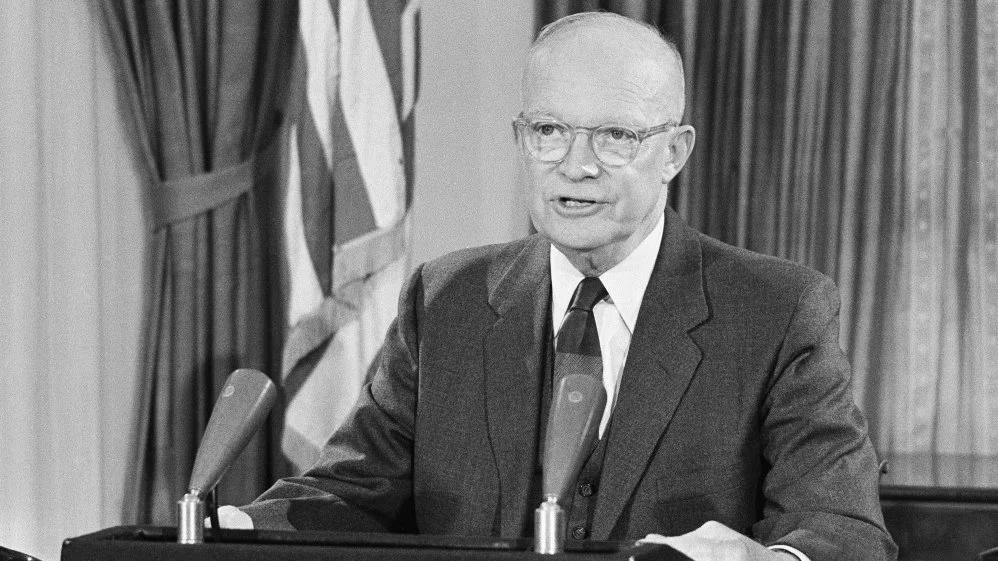OPINION: Stop feeding corporate media’s war machine
“In his final speech from the White House, former President Dwight D. Eisenhower warned that an arms race would take resources from other areas. such as building schools and hospitals.” Photo by Bill Allen, AP Photo.
Michael Riojas is a senior studying journalism and an opinion writer for The New Political.
Please note that these views and opinions do not reflect those of The New Political.
In his farewell address, President Eisenhower gave a stark warning about what he referred to as the military-industrial complex. In short, he stated that once a profitable relationship is created between the government and the defense industry, there will be powerful forces pushing for war. More than 60 years later, this warning rings eerily true, as a relationship between the military-industrial complex and corporate media has emerged.
For upward of 30 years, mainstream media has directly benefited from and pushed for every conflict in which the U.S. has been involved.
Take the Iraq War. When former President George W. Bush (likely) illegally invaded Iraq under the false pretenses of both Saddam Hussein being involved in 9/11 and “weapons of mass destruction,” the media gladly ran with the war. In 2003, a study by Fairness & Accuracy in Reporting (FAIR) focused on major media outlets from across the political spectrum found that more than two-thirds of all sources presented were pro-war. Only 10% of media sources were anti-war, and viewers were more than six times as likely to see a pro-war source compared to an anti-war source.
What about the Gulf War? According to a 1991 study by researchers at The Center for the Study of Communication at UMass Amherst, people who watched mainstream media were more likely to support the war and less likely to know essential facts about the conflict. As part of a scathing conclusion, the authors noted “Television, as the ‘information’ source most people depend upon, is particularly responsible. While support for the war was extraordinarily strong, it was at least partly built upon a body of knowledge that is either incorrect or incomplete.”
A survey by FAIR of the sources on the ABC, CBS and NBC nightly news in the first two weeks of the war found that of 878 on-air sources, only one was a representative of a national peace organization, whereas seven were football players in Super Bowl XXV who were invited on to discuss the war. Only about 1.5% of sources were protesters of the war. Additionally, NBC was owned by General Electric during this time, which has consistently been one of the top arms and parts dealers for the U.S. military.
As for the War in Afghanistan, the media was once again accused of under-reporting civilian casualties and destruction. When a correspondent at CNN reported from the rubble of the streets in Kandahar, Afghanistan, the network quickly switched to footage of 9/11, according to the New York Times. The anchor “reminded viewers of the deaths of as many as 5,000 people whose ‘biggest crime was going to work and getting there on time,” effectively justifying one horrifying tragedy with another.
But how does all this benefit corporate media? Let’s take a look at the Russian-Ukrainian war as an example. In January, before the war began, Fox News averaged 2.24 million primetime viewers, while CNN averaged 633,000. In March, after the invasion, Fox’s primetime viewers increased to 2.86 million, and CNN’s average viewers skyrocketed to 1.22 million, a staggering 92% increase. This is the effect of the military-industrial complex on the media, and all it took was a war, one the U.S. isn’t even a part of.
While Fox News is topping charts with a record number of viewers, Tucker Carlson has shared Russian talking points on his show, earning the favor of the Russian government. Sean Hannity has suggested intervention that would likely start World War III.
It’s dystopian that mainstream media tends to push for war just because it is in their best interest. Just six conglomerates own 90% of all American media. These corporations not only have a monopoly on media but a monopoly on public opinion. There are plenty of reasons to abandon mainstream media in favor of more reputable sources. We should avoid TV news altogether, opting instead to read our news directly from journalists, so we can make our own opinion, and not be compelled by propagandists telling us what to think.

